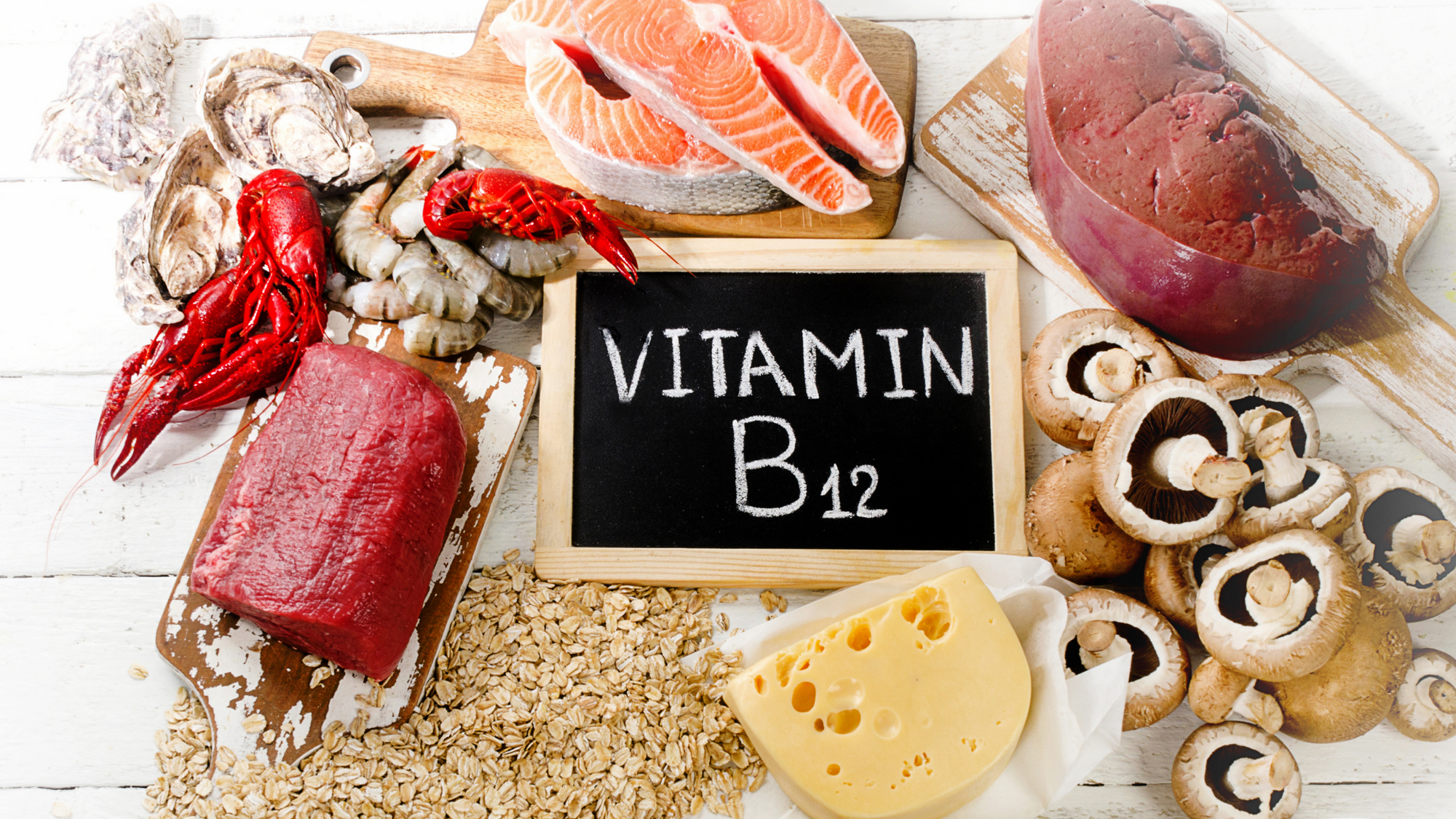Did you know? Testosterone is not just a sex hormone! We'll show you how important it is for men and women.
Testosterone: This is how much influence your food has on the sex hormone
Testosterone makes you aggressive, strong and helps men lift enormous weights in the gym - that's one of the common prejudices. But very few people know that this sex hormone is also important for the female body and can be controlled in part through diet. In this article, we'll explain what testosterone is exactly, what it regulates in the body and which foods are suitable for keeping your T-level at a healthy level in everyday life.
IT'S WORTH READING!
AT THE END OF THE ARTICLE WE WOULD LIKE TO GIVE YOU A LITTLE JOY WITH A VOUCHER!

Why do you need testosterone?
Like many things in the body, testosterone levels change with age. From around the age of 25, men's testosterone levels begin to naturally drop. That doesn't sound dramatic at first.
However, there are studies that suggest a link between low testosterone levels and diseases such as obesity or even premature death. [1]
And although testosterone is perceived as an almost exclusively male hormone that plays an important role in sperm production, it also plays a role in the female body: in addition to sex drive, it also contributes to the formation and maintenance of muscle strength and bone density in women.
Among several diseases in which testosterone - or its lack - plays a role, hypogonadism is one of the most common. This lack of sex hormones can affect both men and women. In both cases, the germ cells (ovaries or testes) produce insufficient sex hormones or none at all. [2]
The result: a disruption of sexual development, which in the worst case can even lead to the regression of secondary sexual characteristics.
In fact, approximately four out of ten men over the age of 45 suffer from hypogonadism. Since 2012, the number of cases in which older men have been diagnosed with low testosterone levels has increased by a full 170 percent. [3]
The fact that low T levels are not uncommon these days is confirmed by another study that seems to support the findings of the one just mentioned. It revealed that prescriptions for testosterone preparations have increased fivefold since 2012. [4]
So it's clear that testosterone is important. But what exactly does it do in the body?
Testosterone under the microscope
Testosterone is a hormone, more precisely a sex hormone (androgen), which occurs in men and women and acts as a messenger substance that triggers necessary changes in the body. [5]
By the way, this does not only apply to libido, but also to things like fat metabolism or bone stability.
While women's ovaries produce small amounts of it, in men the Leydig cells in the testes are responsible for producing the hormone. In addition, small amounts are produced in the adrenal glands in both sexes.
In addition to sperm production, the sex hormone regulates other functions in men, such as fat distribution in the body, muscle and bone mass, the production of red blood cells and, of course, last but not least, sex drive. [6]
During puberty, it stimulates body hair, fuels sexual desire and helps on a hormonal level to turn the boy into a man.
And what about aggression? Has testosterone earned its reputation in this regard? A review that analyzed 45 studies on the relationship between aggression and testosterone found that there is indeed a positive - albeit weak - relationship between the two in humans. [7]
However, a low testosterone level causes other symptoms in men. These include mood swings and even depression , a decrease in body hair, thinner bones and lower self-esteem.
Obesity, nicotine, alcohol and the stress hormone cortisol are also considered testosterone killers that you should avoid for the sake of your health. [8] 
What role does nutrition play?
There are a number of ways you can influence your testosterone levels. These include testosterone supplements, testosterone replacement therapies or prohormone supplements.
However, if you would like to try a different approach first, there are various options available to you through your own diet. [9]
Alone or in combination with medical measures, testosterone-boosting foods are said to help achieve and maintain healthy levels of the hormone.
1. Macronutrients
Macronutrients (macros for short) are substances that are essential for life and are used by your body to generate energy. They are generally considered to be the basic building blocks of our diet. We are talking about carbohydrates, proteins and fats. [10]
Studies have shown the influence of carbohydrates on the formation of testosterone levels, especially in active men and during training. [11]
In addition to fat loss, a sufficient protein intake also supports the formation and maintenance of healthy testosterone levels. [12]
As for the third element, fat, studies have shown that adequate intake is also beneficial for the production of the sex hormone as well as for health in general. [13]
Omega-3 fatty acids in particular are recommended. Animal studies have shown that fish oil can increase sperm quality and testosterone levels by improving fatty acid profiles. [14]
The German Nutrition Society (DGE) recommends eating fish and seafood once or twice a week. [15]
It makes the most sense to eat a balanced diet. Whole foods, with a balanced ratio of macro and micronutrients, are not only good for your hormone levels, but also offer many health benefits in general.
2. Vitamins
Vitamins are organic compounds that are needed for a whole range of vital body processes. It is therefore only logical that they also have an influence on the production of testosterone.
First and foremost is vitamin D. It is considered a real testosterone booster and guarantees high sperm quality. [16] [17]
One study found a connection between the increase in vitamin D in the body through exposure to sunlight and a corresponding increase in testosterone levels. 15
However, another study showed that the administered vitamin D only worked in men who already suffered from a deficiency. In subjects with healthy levels of the vitamin, no increase in T levels was found. [18]
Foods rich in vitamin D include cod liver oil, smoked eel, herring, dark chocolate, avocados and eggs.
The best source of vitamin D, however, is sunlight. Our skin produces vitamin D when it comes into contact with sunlight. In our latitudes, however, it is difficult to meet the vitamin D requirement naturally. For this reason, many people benefit from a vitamin D supplement (especially in winter).
It is also suspected that there is a connection between other vitamins - including vitamin A, vitamin C and vitamin E - and the level of testosterone in the body. However, further research is ongoing. [19]
3. Minerals
When it comes to minerals and testosterone, zinc is almost always mentioned first because this mineral or a zinc-containing enzyme is involved in the production of the sex hormone.
One study found that there is a direct connection between a man's sexual well-being and zinc: a falling level of zinc had a negative effect on fertility, among other things. [20]
Magnesium also plays a role in testosterone. Another study showed that in men who had low magnesium and testosterone levels, testosterone production could be boosted by administering magnesium. [21]
The German Nutrition Society (DGE) recommends that an adult man consume up to 16 milligrams of zinc daily. [22]
The recommended intake of magnesium for a man is up to 400 milligrams daily. [23]
Good sources of zinc include milk, cheese, eggs, beef and pork, whole grains, nuts and soybeans. You can also find magnesium in fish, poultry, potatoes, berries and bananas.
4. Creatine
Creatine became known to the general public as a booster that is used primarily in gyms. Although creatine can be produced by the body itself from various amino acids, the substance is now enjoying great popularity as a dietary supplement.
In fact, creatine is said to have an influence - albeit slight - on the production of testosterone. A study of college football players who took creatine supplements for ten weeks showed increased testosterone levels after the study. [24]
However, the consumer advice center is critical of creatine. [25]
The carbon-nitrogen compound can be found in fish and meat, such as pork or beef, salmon, herring or cod.
5. DHEA
Dehydroepiandrosterone (DHEA) is a steroid hormone produced from cholesterol and is the most abundant hormone in the human body. It is the precursor to female or male sex hormones, as the body can convert it into either estrogen or testosterone, depending on the hormonal circumstances. [26]
So can DHEA affect your T levels?
Opinions are divided. There are studies that suggest an increase in testosterone levels when taking DHEA supplements, especially with increasing age. [27]
Other studies, however, conclude that the administration of DHEA has no effect on testosterone production in the body. [28]
Therefore, further investigations are needed to get a clear picture.
Bonus: What else you can do
If you browse the internet, you will find many other remedies, recommendations and supplements that promise to give you high testosterone levels. Here is a small list of additional ways for you to influence your T-level.
Sleep well. Find the ideal amount of sleep for you and stick to it. 7 to 10 hours per night are recommended for long-term health. One long-term study found that people who slept only four hours per night had borderline testosterone levels. [29]
Avoid stress. Constant rushing and constant stress promote, among other things, the production of the hormone cortisol, which in turn can lower the level of testosterone in your body. [30]
In addition to mediation, good methods for combating stress include having a fulfilling hobby or spending time with friends and family.
Exercise. Exercise is murder? Absolutely not! Apart from the fact that we were born to do it, exercise has many benefits - both physical and psychological. Studies have shown that regular exercise has a major impact on the production of sex hormones. [31]
So it’s time to try strength training or HIIT!
Conclusion: A lot can be regulated through diet
Testosterone is a hormone that not only regulates sex drive, but is also involved in many other bodily processes. It is equally important for men and women, although the female body produces less of it. Therefore, a lack of testosterone can lead to various diseases.
In addition to exercise, stress reduction and sufficient sleep, it is possible to influence the body's own testosterone production through your own diet. Proteins, fats and carbohydrates are just as important as vitamins and minerals.
AS PROMISED, YOU WILL RECEIVE A 10% VOUCHER ON OUR LIQUID VITAMIN D3 ,Magnesium , Zinc and Omega-3 .
SIMPLY COPY THE CODE HORMON+V10 AND ENTER IT AT CHECKOUT.
Click here to SHOP
[1] https://pubmed.ncbi.nlm.nih.gov/25041142/
[2] https://pubmed.ncbi.nlm.nih.gov/30100005/
[3] https://smw.ch/article/doi/smw.2012.13539
[4] https://www.ncbi.nlm.nih.gov/pmc/articles/PMC4707424/
[5] https://www.nih.gov/news-events/nih-research-matters/understanding-how-testosterone-affects-men
[6] https://pubmed.ncbi.nlm.nih.gov/16042359/
[7] https://www.sciencedirect.com/science/article/abs/pii/S135917890000032X?via%3Dihub
[8] https://pubmed.ncbi.nlm.nih.gov/6348068/
[9] https://pubmed.ncbi.nlm.nih.gov/3360302/
[10] https://www.dge.de/presse/pm/ueberarbeite-dge-broschuere-die-naehrstoffe-bausteine-fuer-ihre-gesundheit-ab-sofort-erhaeltlich/
[11] https://pubmed.ncbi.nlm.nih.gov/11402256/
[12] https://pubmed.ncbi.nlm.nih.gov/10355847/
[13] https://pubmed.ncbi.nlm.nih.gov/23472458/
[14] https://www.ncbi.nlm.nih.gov/pmc/articles/PMC4948075/
[15] https://www.dge.de/presse/pm/regelmaessig-fisch-auf-den-tisch/
[16] https://pubmed.ncbi.nlm.nih.gov/19321573/
[17] https://pubmed.ncbi.nlm.nih.gov/20050857/
[18] https://pubmed.ncbi.nlm.nih.gov/23686706/
[19] https://pubmed.ncbi.nlm.nih.gov/17004914/
[20] https://www.ncbi.nlm.nih.gov/pmc/articles/PMC6010824/
[21] https://pubmed.ncbi.nlm.nih.gov/24723948/
[22] https://www.dge.de/forschung/referenzwerte/zink/
[23] https://www.dge.de/forschung/referenzwerte/magnesium/
[24] https://pubmed.ncbi.nlm.nih.gov/17136944/
[25] https://www.verbraucherzentrale.de/wissen/lebensmittel/bedarfsergaenzmittel/kreatin-nur-in-seltenen-faellen-hilfreich-8089
[26] https://pubmed.ncbi.nlm.nih.gov/25022952/
[27] https://pubmed.ncbi.nlm.nih.gov/23417481/
[28] https://pubmed.ncbi.nlm.nih.gov/15636426/
[29] https://pubmed.ncbi.nlm.nih.gov/17520786/
[30] https://pubmed.ncbi.nlm.nih.gov/6348068/
[31] https://pubmed.ncbi.nlm.nih.gov/22234399/


















